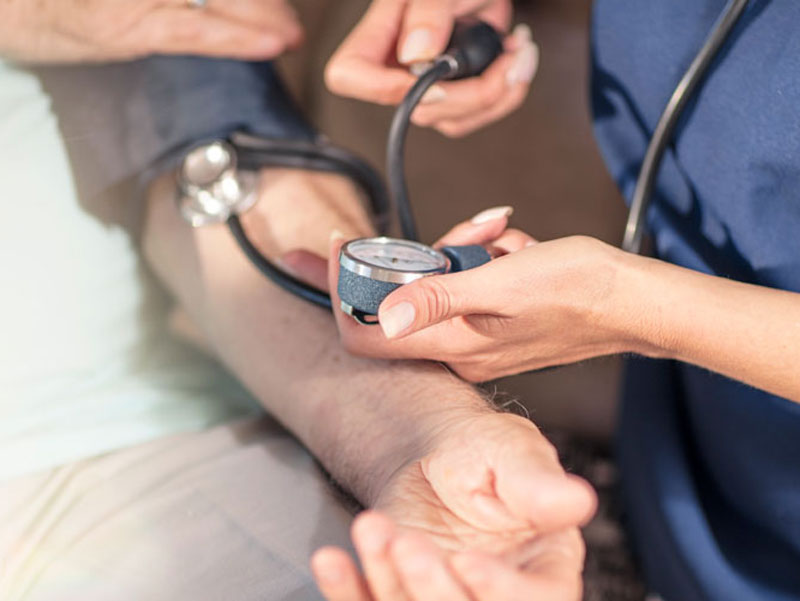As Good Samaritan Society locations develop a cadence for monitoring residents and staff for COVID-19 symptoms, they’ve found success in new routines.
Close collaboration among health officials, the Centers for Disease Control and Prevention and the Good Samaritan Society has helped to catch positive cases of COVID-19 early and enable other locations to learn from success stories.
“Having now had positive cases at my locations, I can share my experience and encourage other locations that they can get through this,” said Deb Braley, a rehab/skilled nursing consultant for Good Samaritan Society locations in Kansas, North Dakota and Colorado. Across the U.S., the Good Samaritan Society has locations in 24 states.
A new routine
Back in March, Braley began the task of gathering and communicating local, state and federal COVID-19 guidelines for the rehab/skilled care locations she supports. Since then, residents have had their vital signs taken and a COVID-19 assessment done at least once a day, usually every eight to 12 hours at the start of each new shift.
“In my experience as a registered nurse, I know that older adults typically have lower body temperatures than younger people, so there was a lot of education to locations’ nursing staff to really watch for those slight increases in temperature above their baseline,” she said.
The five main vital signs staff take include temperature, blood pressure, pulse, respiration rate and oxygen saturation level. Typically, residents only have their vital signs taken per a doctor’s orders or nurse’s clinical judgment. Making the switch to doing this assessment during each shift has led to new routines.
“While it is a lot of extra work, it’s work that’s necessary to keep our residents as safe as possible,” said Lori Zahn, a rehab/skilled nursing consultant for locations in Nebraska.
Read more: How can I tell if I have COVID-19?
Additionally, monitoring for any symptoms among staff means screening employees before they start their shift. In locations that have positive cases of COVID-19, that frequency increases to twice a day. Staff also go home if they start to feel ill, according to CDC recommendations.
“It’s really continuous education about COVID-19 and what we’re learning from the CDC, so it’s a process of having constant conversations,” Zahn said.
Early testing
In some places, statewide testing has also helped to identify asymptotic residents.
When North Dakota began statewide testing in early May, five residents in Bismarck tested positive but did not experience any symptoms.
“As soon as they got those results, staff sprung into action and already had a plan for a unit they were able to move those residents to,” says Braley. “They’ve all since received two subsequent negatives and were able to be moved back.”
As a practicing nurse for 26 years, Braley says she felt as prepared as possible for helping to lead locations through quickly implementing COVID-19 safety measures.
“It was still quite a learning curve with a lot of adjusting for all of us,” she said.
Watch video: Facebook Live Q&A with Good Samaritan Society VP Nate Schema
Now several months into the pandemic, locations continue to work closely with local, state and federal health officials to evolve measures and stay up-to-date on guidelines.
A team effort
But another — almost equally important — resource has been other locations.
It was after a location in South Dakota noted a change in blood pressure and pulse rate that Zahn also began paying close attention to these two vital signs among the residents in her own locations.
“At first, I was looking for signs of fever and a drop in oxygen saturation, but my focus changed to include a close look at all of the vital signs,” she said.
For some residents who had the virus, their blood pressure dropped and their pulse went up before they developed a fever.
Dedication like this to watching for COVID-19 symptoms early on has been a team effort among locations and staff.
“I believe our staff has gone above and beyond to try and make sure our residents are protected,” Braley said. “This is what they do and they’re committed to it. It’s their passion.”
Read more
- Good Samaritan Society receives national immunization award
- COVID-19 Q&A: Pandemic operations at Good Samaritan Society
- Good Samaritan focuses on safety and well-being of residents
…
Posted In Bismarck, COVID-19, Senior Services
